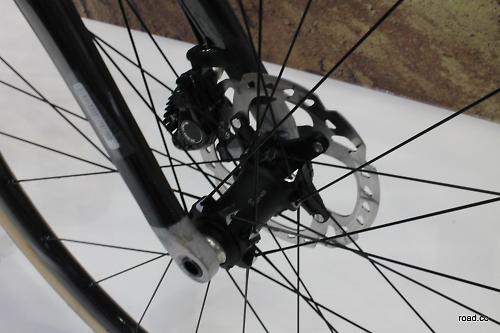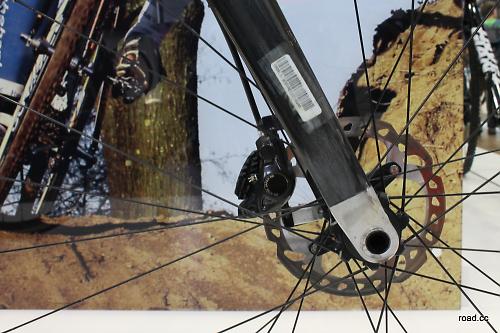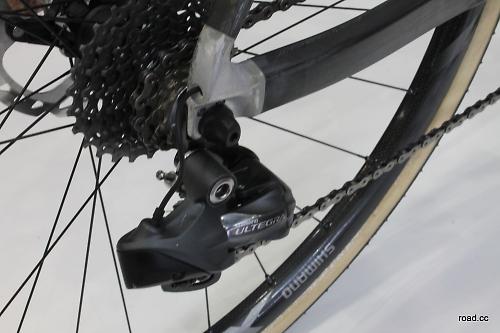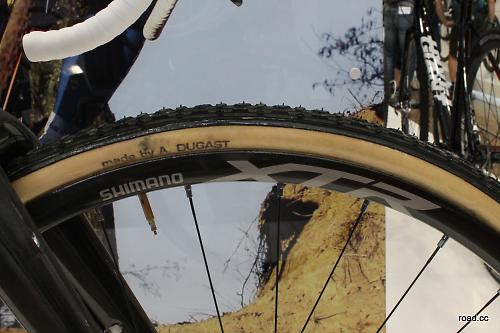- News
- Reviews
- Bikes
- Components
- Bar tape & grips
- Bottom brackets
- Brake & gear cables
- Brake & STI levers
- Brake pads & spares
- Brakes
- Cassettes & freewheels
- Chains
- Chainsets & chainrings
- Derailleurs - front
- Derailleurs - rear
- Forks
- Gear levers & shifters
- Groupsets
- Handlebars & extensions
- Headsets
- Hubs
- Inner tubes
- Pedals
- Quick releases & skewers
- Saddles
- Seatposts
- Stems
- Wheels
- Tyres
- Tubeless valves
- Accessories
- Accessories - misc
- Computer mounts
- Bags
- Bar ends
- Bike bags & cases
- Bottle cages
- Bottles
- Cameras
- Car racks
- Child seats
- Computers
- Glasses
- GPS units
- Helmets
- Lights - front
- Lights - rear
- Lights - sets
- Locks
- Mirrors
- Mudguards
- Racks
- Pumps & CO2 inflators
- Puncture kits
- Reflectives
- Smart watches
- Stands and racks
- Trailers
- Clothing
- Health, fitness and nutrition
- Tools and workshop
- Miscellaneous
- Buyers Guides
- Features
- Forum
- Recommends
- Podcast
TECH NEWS
First cyclo-cross world cup win for disc brakes
Today, Lars van der Haar won the first round of the UCI cyclo-cross world cup in Valkenburg, Netherlands. On a bike with hydraulic disc brakes.

For advocates of disc brakes, this is a pivotal moment. The UCI first amended their rule book allowing the use of disc brakes at the highest level of cyclo-cross racing for the 2010/11 season. It's fair to say there has been anything but a flood of adoption with most of the pros have been sticking to well tried-and-tested cantilever brakes. Over on the other side of the pond meanwhile the US scene has seen a lot more disc brake action, quite a handful of the top racers like Jeremey Powers have been racing disc brakes loads.
So, his bike, and those brakes then. Lars raced a Giant TCX Advanced equipped with Shimano's latest hydraulic disc brakes, which our Dave spent three days in sunny Sicily last week riding. The groupset on this bike, which we saw at Eurobike back in September, is a mix of Shimano's Ultegra Di2 and Dura-Ace, though his actual race bike will most likely be a full Dura-Ace groupset - we'll confirm all the spec details on his race bike as soon as we get a closer look.
This bike also had Shimano XTR wheels with Dugust tubs glued on, and used XTR rotors as well. All the wires are neatly routed internally in the carbon frame. The new disc fork has a bolt-thru axle, a large diameter hollow axle that threads into one side of the fork. It makes for a stiffer and more secure set up. There's a regular quick release axle at the rear. And those world champ stripes on his Fizik saddle, they're because he's the World U23 Cyclo-cross Champion. Oh, Giant claim a frame weight of 1,050g, which is mighty impressive if it's true.
It was only a matter of time before this day came. Of course, let's just remember that it's the rider, his legs, tactics and other uncontrollable events, like Sven Nys retiring due to a mechanical failure, that have to be considered when looking at his result. We're not saying the disc brakes were responsible for the win.. Even so, it's not impossible to see the benefits that better brakes offer as being attractive as this level of cyclo-cross racing.
They're more powerful than cantilevers, so you can scrub off speed more easily and quicker, so more speed can be carried into the entry of a corner. There are potential downsides though, clearance between the rotor and pad could be an issue, but it didn't appear to concern Lars in his race today. And there's the fact that the braking surface, at the centre of the wheel and so away from the gloop, should offer more consistently reliable braking.
Many might wonder why it's taken this long for a disc-equipped 'cross bike win at world cup level. Part of the reason is that hydraulic disc brakes from the Shimano and SRAM have only just become available, and even now there are are still supply problems, particularly with Shimano's offerings. Many of the top racers will have been reluctant to adopt a new, and at this level, unproven technology, so they've stuck to tried-and-tested cantilever brakes. Even with this win, as notable as it is, it'll likely be some time before disc brakes begin to outnumber or even replace cantis, if at all.
Many bike industry insiders see disc brakes in cyclocross as a first step towards the widespread introduction of disc brakes on road bike
Will the floodgates for disc brakes in the UCI cyclo-cross world cup be opened now? We'll have to wait until the second round to see...
David worked on the road.cc tech team from 2012-2020. Previously he was editor of Bikemagic.com and before that staff writer at RCUK. He's a seasoned cyclist of all disciplines, from road to mountain biking, touring to cyclo-cross, he only wishes he had time to ride them all. He's mildly competitive, though he'll never admit it, and is a frequent road racer but is too lazy to do really well. He currently resides in the Cotswolds, and you can now find him over on his own YouTube channel David Arthur - Just Ride Bikes.
Latest Comments
- chrisonabike 1 hour 1 min ago
Agreed - if you've had the bike a while you've probably added bits to it / upgraded. In my case that included about 150 quid of cut locks......
- chrisonabike 1 hour 8 min ago
Hmm... I'm sure "more could be done" but there are two parties here. It seems hard to reach people with "council information". Particularly with ...
- mdavidford 1 hour 33 min ago
"Driver fined £100 after stopping to be sick" https://www.bbc.co.uk/news/articles/ce8g13pp0plo
- ktache 1 hour 56 min ago
Not that they would be as technical, or maybe quite as grippy, but does the skate industry provide any solutions?
- wtjs 2 hours 12 min ago
the Metropolitan Police contacted Vikash to inform him that they have created a report for the incident and that the video has been “passed to the...
- Rendel Harris 2 hours 39 min ago
Sorry to be a killjoy but it doesn't amuse me at all, I hope the idiot gets caught and punished. Putting yourself on the same road as pros...
- willpom @GWRaudax 3 hours 14 min ago
Steve Poulton has just published The Cheltenham Flyer - 10th May https://www.audax.uk/event-details/calendar/13235-cheltenham_new_flyer_200
- David9694 3 hours 31 min ago
Chef left with 'car sticking out of house' on crash-hit road...
- HKR 6 hours 25 min ago
It's not 4k though. It's a 4k sensor. But when image stabilization is on, that's chopped down to little over a 1080 image. ...
















Add new comment
10 comments
I don't understand....disc brakes are supposed to be heavy, overheat hubs, boil hydraulic fluid, cut riders legs to bits, cause burns in accidents, create different braking performance between riders, the frames are difficult to engineer to accomodate brakes.
How did this happen I'm at a loss!
It's amazing to me that people still talk about the supposedly negative aspects of disc brakes on road and cx bikes...
Do these people who make those types of comments all live in hot countries with dry conditions?
It's progression.
They work better than callipers.
They use less energy to stop the bike and they do so much more confidently.
People say "what about brake fade and what about discs heating up etc etc".
Balls. Megavalanche, anyone?
Discs stop mountain bikes that weigh twice what the average road bike weighs on steeper descents in worse conditions on terrible surfaces!
Are the haters people who didn't want carbon frames at the start?
It isn't fashion.
Cars stopped using drum brakes because they were rubbish.
Discs are better in every way in all conditions.
I can't wait until they are the standard for road bikes.
Pretty much have to agree. In the real world there really aren't any disadvantages of disc brakes. Yeah they weigh a tad more but most pro bikes are or could be below the UCI minimum now
The other concern with discs was always wheel changes. But that isn't really a problem at pro level cross as they will do a bike swap in the pits.
Some class posters on this here article. Worland & Hamvas. Likey.
"We're not saying the disc brakes were responsible for the win.. "
but they obviously aren't a disadvantage! And in the end a win is still a win.
Last year I watched Belgian U23 rider Joeri Hofman float around the Shrewsbury cyclo-cross course, finishing 2 minutes ahead of National Trophy contenders Paul Oldham and Oli Beckinsale. There is a LOT more to being fast than having better brakes!
@monty - was it really Di2's fault? Nys apparently crashed while leading, had 2 punctures and then his chain broke.
3rd and 4th for Nikki Harris and Helen Wyman respectively in the women's race. Abby-Mae Parkinson was riding her first WC race at 16.
I expect that De Haar's victory was more to do with the unreliability of Di2 - Pauwels and Nys both suffered mechanicals
Err, from the looks of things, de Haar was running Di2 - if he's using Shimano hydraulic brakes as the report says, it'll definitely be Di2 as that's all that's currently available.
And how is Di2 "unreliable"? It's been used in road & CX for years and the only problems are caused by the same things that trouble mechanical systems - mud clogging it or branches jamming in the mech.
The interesting thing is that Sunweb team riders seem to be suffering a lot more from drivetrain problems than other Di2 users. Vantornout lost a World Cup win in Rome in January due to a drivetrain malfunction, Pauwels lost the overall World Cup in Hoogerheide, again, due to drivetrain malfunction. As if they've been supplied with a bad batch of Di2 parts.
Something few people talk about with discs on CX bikes is that they require so little upper body energy to use. Cross riders, even at top level, often suffer from forearm cramps during and after races on courses that require a lot of heavy braking combined with bumps. Theoretically, saving energy on braking means it's available to use elsewhere. The US racers talk about this, Euro racers seem more obsessed with saving a few grams of weight